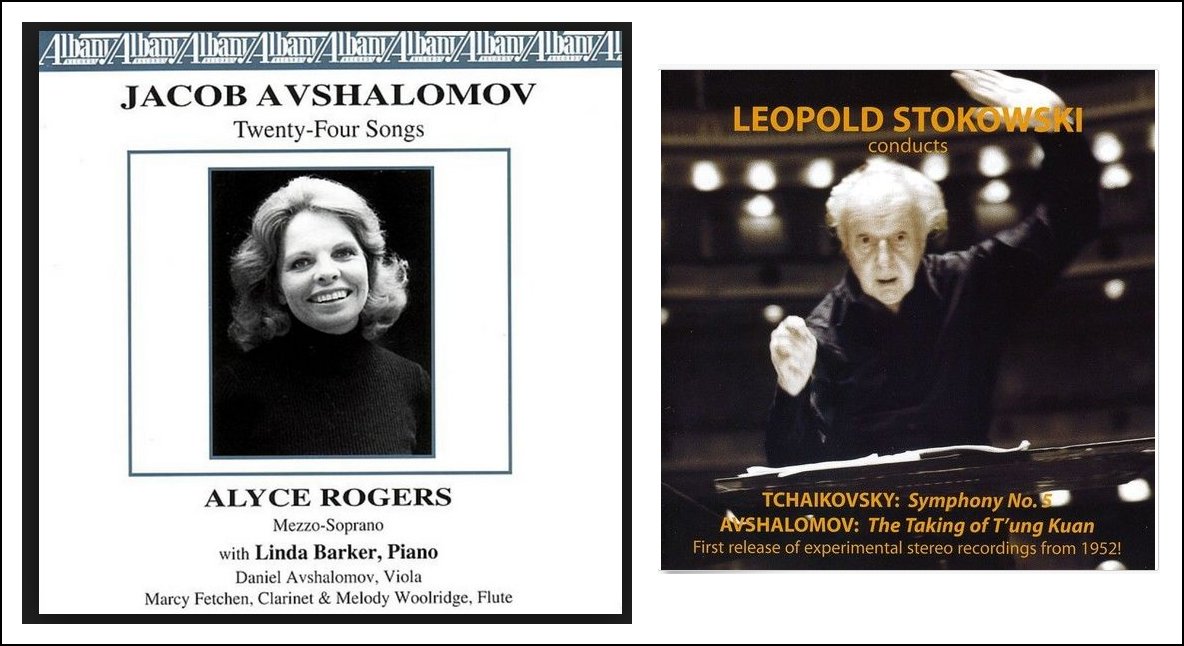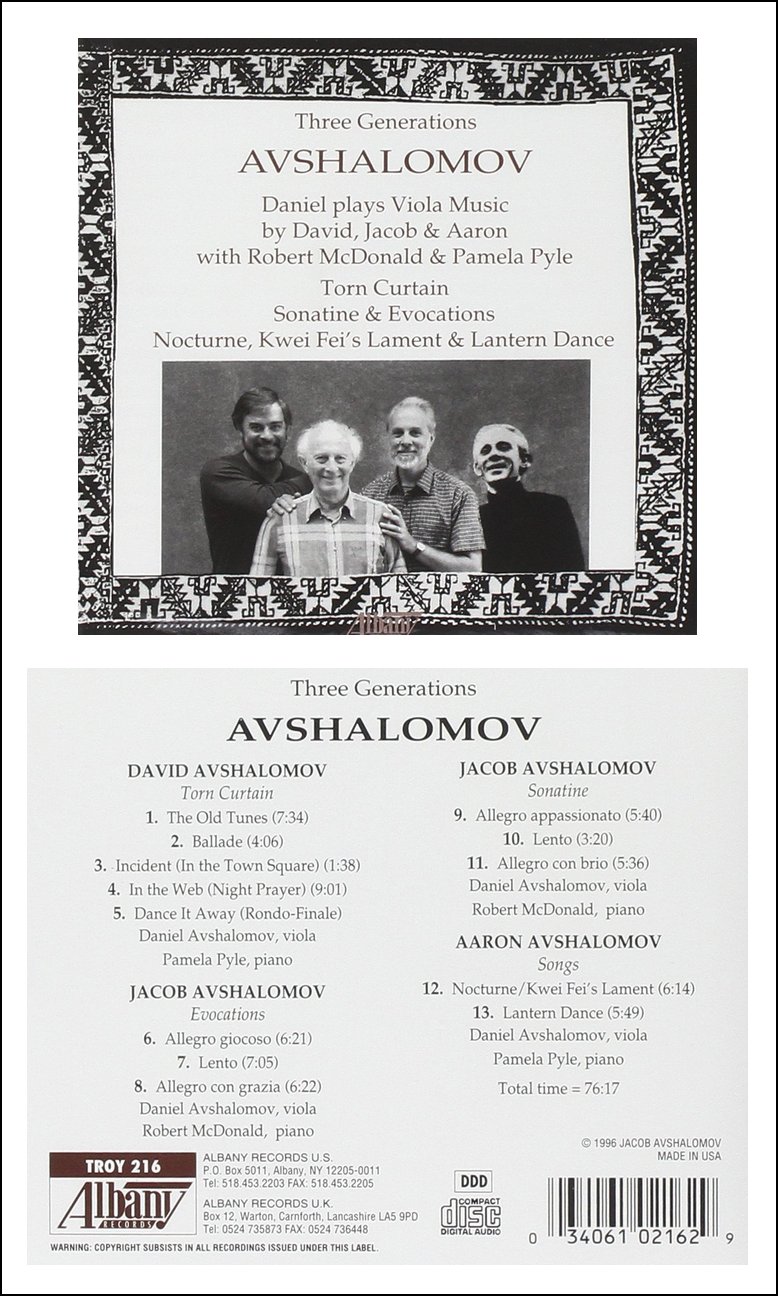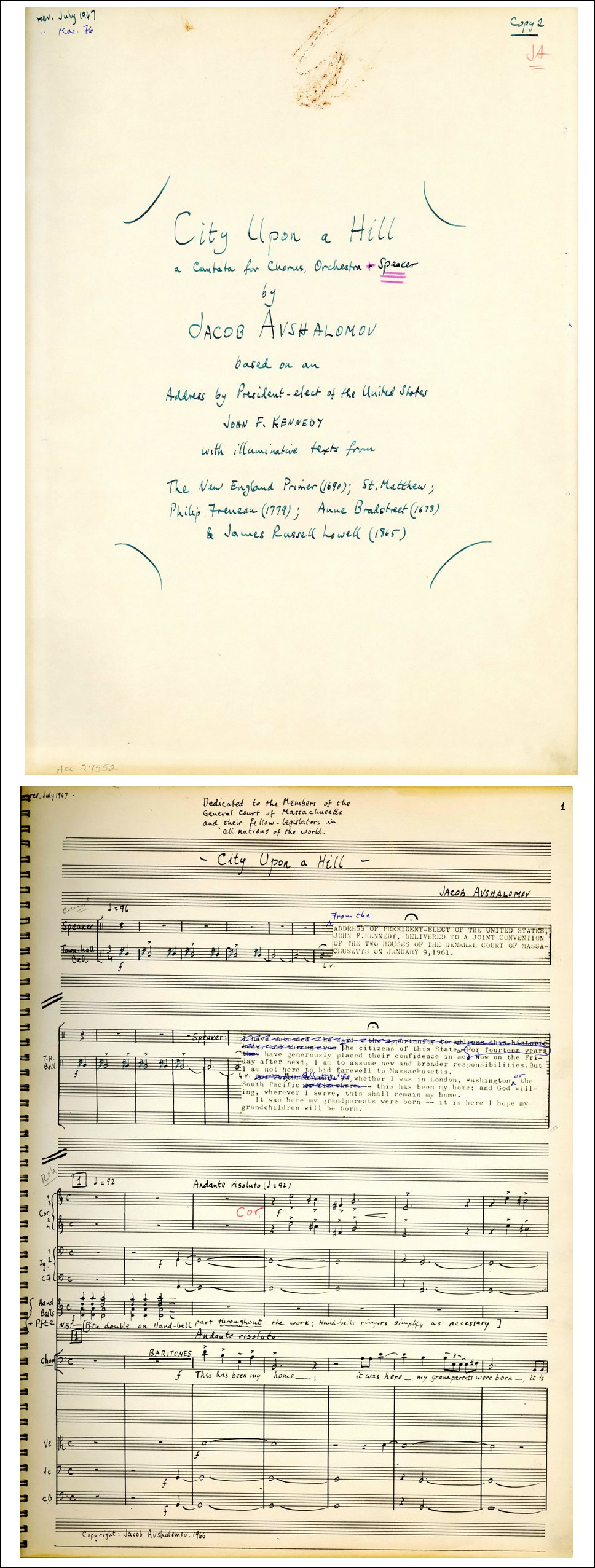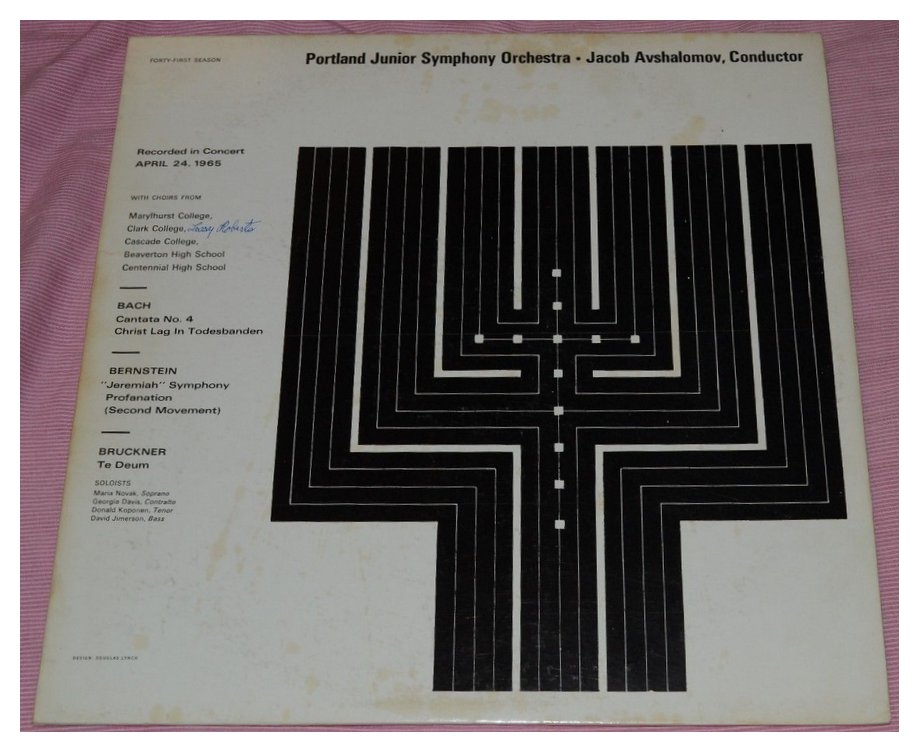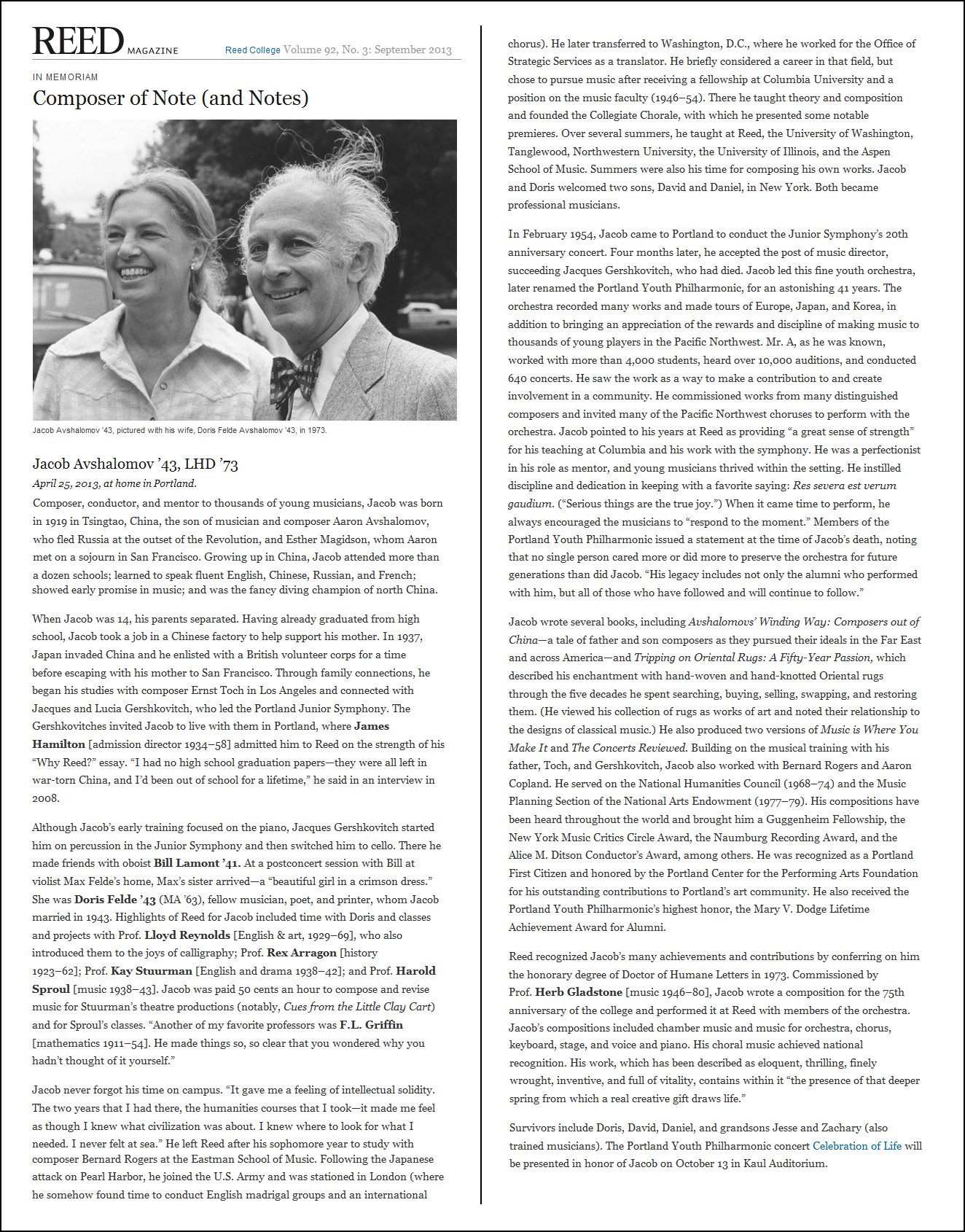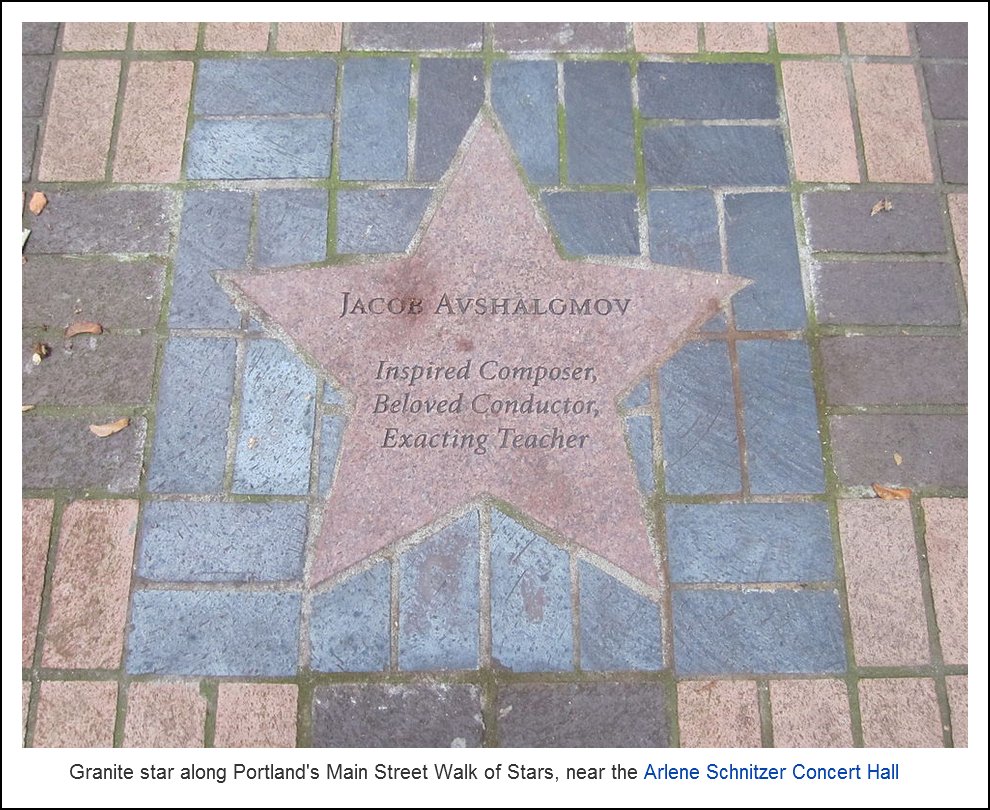Composer / Conductor Jacob Avshalomov
A Conversation with Bruce Duffie
In March of 1986, Jacob Avshalomov was honored by the College of DuPage
in Glen Ellyn (a suburb about twenty-five
miles west of Chicago) with a concert of his music. There
was a whole week of activities including lectures and master classes, as well
as the performance.
An obituary with another photo and many details of his life
appears at the bottom of this webpage. As usual, names which are links
on this page refer to my Interviews elsewhere on my website.
He was most gracious to take time from his busy schedule for an interview,
and was interested in knowing of others I had met. I showed him a list,
and he commented that many were friends and colleagues.
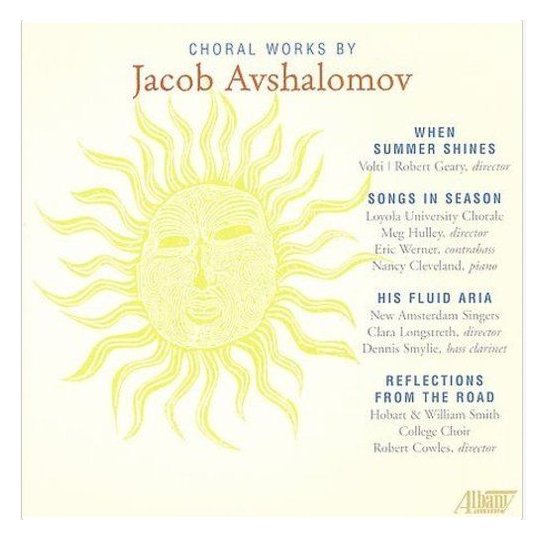
Since I knew he had written quite a bit of vocal music, we started
at that point . . . . . . . . .
Bruce Duffie: Have
you written an opera?
Jacob Avshalomov:
No, I have never written an opera.
BD: Why not?
JA: To write
an opera is an enormous investment of all kinds for a composer. The
possibilities of performance are often slim, unless you live in the center
where you have immediate contacts of that kind. Subject is another
problem. A long time ago, I found a very satisfactory alternative to
opera, which is the sort of oratorio approach to things. I like to
use elevated and interesting texts with voices — solo
and large groups, accompanied and unaccompanied — but
not necessarily clothed and acted out. The kinds of texts that I’ve
been interested in didn’t require very much, and so that was a very satisfactory
solution. I skirted once very closely to the chance of doing an opera,
and that was to the story by John Hersey called A Single Pebble. John Hersey, as
you may or may not know, was born and brought up in China. The novelist
lived in the same city as I grew up in — Tsingtao
— but we missed each other by three years.
He’s a little older than I, and he wrote this beautiful book about an American
engineer who goes out in the early 1920s to seek a site to put up a dam.
The story of his up-river trip with some peasant boatmen is very touching
and beautiful, probably his most poetic book. I fell for it, partly
because of the subject matter. I wrote to him, without any introduction,
saying that we missed each other by three years, and was taking the liberty
of contacting him, and so on. He invited me out to see him in Connecticut,
and I brought some of my music. In fact, I sent him a tape of the Sinfonietta, which you heard rehearsing
today, and he liked my music well enough. The more we talked, the more
we felt we needed to await the time when we could maybe make an art film
of it, because the gorges of the Yangtze River were central to the scenery
of that opera. So we postponed the work, and over the years I’ve never
gotten back to it. So why I’ve never written an opera is due to laziness,
I guess!
BD: It got so
far and then stopped?
JA: That’s right.
I recently had a very nice exchange with Hersey. I finished one of his
later books, The Call, which is
a novel with a very exhaustive description of the missionary movement in
China where his father had served in the YMCA for a long time. It provided
me with a glimpse of China from that point of view that I had never known,
even having been there three times in the last six years. But I was
very grateful for those insights, and I just picked up the phone and tracked
him down in Florida to thank him for the book, and congratulate him, and
wished him Happy New Year. He was astonished to have this call out
of the blue, and I got the sweetest letter from him the week later.
So that’s my near-miss with John Hersey. A lovely man!
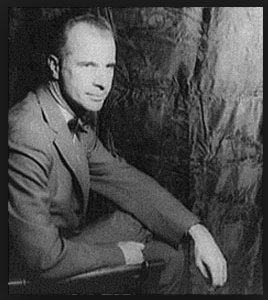
John Richard Hersey (June 17, 1914 – March 24, 1993) was a Pulitzer Prize-winning
American writer and journalist considered one of the earliest practitioners
of the so-called New Journalism (a term which he decried), in which storytelling
techniques of fiction are adapted to non-fiction reportage. Hersey's account
of the aftermath of the atomic bomb dropped on Hiroshima, Japan, was adjudged
the finest piece of American journalism of the 20th century by a 36-member
panel associated with New York University's journalism department. On April
22, 2008, the United States Postal Service issued a set of first-class postage
stamps honoring five journalists of the 20th Century, and Hersey was among
them. Also, a school in Arlington Heights, Illinois (in suburban Chicago)
was named for him, and in 1985, the John Hersey Prize was endowed at Yale
University.
[Photo at left of John Hersey was taken in 1958 by Carl Van Vechten]
|
BD: How long
did you spend in China before you left?
JA: I was born
there, and I left at the age of nineteen.
BD: So it was
really all your development?
JA: Yes.
There was a little hiatus of three years between the ages of six and nine
when we came to this country thinking to emigrate. But we came on a
tourist visa which was renewed, and renewed, and renewed until my father finally
lost patience and courage, and we went back to China. So essentially
I lived there for a total of sixteen years, but I got all my formative years
in grade school and high school, and four years’ factory work before I ever
came back to the United States with my family.
BD: How have
the Chinese elements or the whole Chinese culture influenced your music?
JA: It’s quite
noticeable in the early works, and less and less the closer we get to the
present. From ’37 to about ’45 or ’46, almost everything I wrote had
some Chinese influence, in the sense that the melodies I used were apt to
be cast in the pentatonic mode, and the texture was apt to be more contrapuntal
than harmonic, with the avoidance of triadic structures and seventh chords.
It gave quite an oriental cast, and this was also apparent in the coloration
of the orchestration with the use of percussion and things of that kind.
But the longer I lived here, the further I got away from China and the fainter
those memories were, the less truthful they were to my present existence,
you might say. So without ever consciously relinquishing it, it just
sort of faded a little like old ink.
BD: Did you pick
up American musical idioms, or European musical idioms, or just grow with
what was there?
JA: That’s more
for you to say, listening to what you have heard or will hear, but I can recognize
some Western influences in my own music without any sense of conscious imitation.
For a time I was very enamored with Ernest Bloch, and there are some influences
of that partly because I gravitated to setting some Old Testament texts.
Then there are some influences from a completely extraneous source in the
music of the Tudor period in England, and the madrigal literature. My
wife introduced me to madrigals and madrigal singing before we were married
as college students in Portland, Oregon. Then later, when I studied
at the Eastman School, I naturally I took sixteenth century counterpoint,
and I fell heir to the madrigal group there, which I conducted. During
World War II, when I went to England as an American GI, I sort of wormed my
way into a wonderful chorus at the Brompton Oratory, which is probably the
leading place for Catholic worship and music of that kind in England.
Men being in short supply, they would take a wheezy tenor like myself, and
I sang there for the better part of a year. I also inherited three singing
groups of various kinds. So I became very well acquainted with the
music of that period. That left its mark on me, and it had some influence
on the textures of my choral music. One always has people that one
admires with other spiritual affinity. I also love the music of Bartók,
and I admired some things of Hindemith and people in that generation.
BD: Are you still
influenced by things around you?
JA: Is there
anybody that isn’t? [Both laugh]
BD: Let me change
it then. How much are you influenced by day to day activities, or even
just things you hear on the news?
JA: I am moved
and touched by things that happen in the world all the time, but I can’t say
that they register in my music as far as stylistic elements, nor really, for
that matter, in subject matter. I’ve tended not to use contemporary
subjects — although I have
set a number of contemporary poets — but not in the
sense of having the earthquake in Mexico City move me to write a cantata on
that, or the new recordings of whale songs move me to write piece the way
it did move Alan Hovhaness,
for example. I react to things, but they don’t necessarily reflect in
pieces I write.
BD: Do you keep
up with works that are being written by other composers?
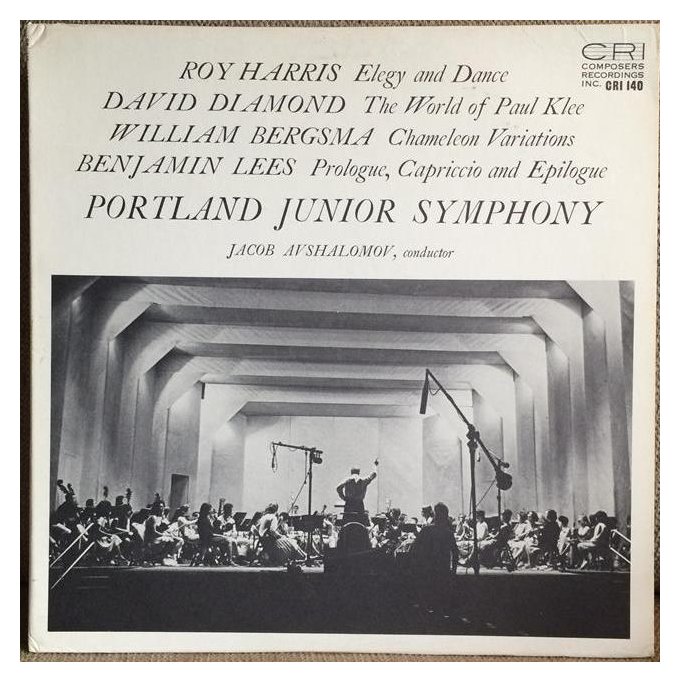 JA: I conduct The Portland Youth Philharmonic [formerly the Portland Junior Symphony],
which is the first-founded youth orchestra in this country. It’s sixty-two
years old and I’ve been with it for thirty-one years.
JA: I conduct The Portland Youth Philharmonic [formerly the Portland Junior Symphony],
which is the first-founded youth orchestra in this country. It’s sixty-two
years old and I’ve been with it for thirty-one years.
BD: Half its
life!
JA: Right, half
its life, and we have commissioned works by living composers. People
like William Bergsma,
Robert Ward, Benjamin Lees, Roy Harris,
Goffredo Petrassi in Italy, and others have all appeared on our programs in
works which we commissioned and later recorded for CRI [shown at right]. But I have to say,
I have not kept up with what could be called the ‘avant-garde’
— the Young Turks — in the last number
of years. A lot of music that’s written by them just does not appeal
to me, just doesn’t interest me, and conducting the kind of orchestra I do,
where they are students, I’ve always felt that one’s enthusiasm is a very
important ingredient. It’s very hard to impart enthusiasm for something
that doesn’t move you or reach you, and I’ve tried never to be false about
that. So the contemporary works we do tend to be more traditional in
their orientation, plus the fact that a lot of the avant-garde music doesn’t
really call for a full orchestra. When you’re dealing in a teaching
situation with a large orchestra, it’s unfair to do pieces that call for seventeen
instruments and leave the other sixty-seven out, quite aside from the matter
of taste. This is a long and involved answer to your innocent question,
but for those combined reasons I haven’t really kept up with a lot of the
avant-garde music.
* *
* * *
BD: You can teach
orchestral technique and instrumental playing. Can you ‘teach’
composition?
JA: You can teach
techniques of composition. Let me recount an anecdote — a
truthful one — about my friend and colleague, Jack Beeson, who’s well
known as an operatic composer, and who was my classmate at Eastman and in
my college in Columbia for many years. He had the good fortune of some
contact with Bartók in his last year or two in New York, and Beeson
went to him with several of his own piano sonatas under his arm. He
asked if he could study composition, and Bartók demurred. He
said he didn’t think that composition could be taught, but Beeson, the bright
man that he is, said, “Yes, but it can be learned!”
So they agreed that he would study his own piano sonatas under Bartók
as a means of talking about compositional problems, which was a wonderful
way to do it. So I would agree that in the deepest sense you can’t teach
composition, but I have, from time to time — in my
Columbia days, and in University of Washington days, and elsewhere at university
teaching stints — done what I could in good conscience
do. I called it a ‘compositional lab’. It’s a compositional laboratory,
rather than teaching composition, because there’s a certain sense, or certain
lack of humility, in seeming to imply that you can show someone how to be
creative. That you can’t do.
BD: Then where’s
the balance then between inspiration and technique?
JA: Ah!
I can answer that in quite a clear way by telling what I did do in these
classes. I would take students through a graduated series of small
tasks, which were to write on the model of certain well-known pieces.
We would take a prelude of Chopin, and the whole class would analyze it structurally,
melodically, harmonically, rhythmically, spiritually, and every other way
the class might think of. We would all jot it down on the blackboard,
and we would objectify this piece until there was nothing else to be wrung
out of it. Then they would all have the assignment to produce a piece
that didn’t sound anything like the Chopin but would follow the objective
outline that we had put on a blackboard. Later they would come in,
and they would each look at them and see what they did with their melodies,
and what they did with their harmonies. Did the climax come about this
far into the piece, and did it end here and did it end there? Were
the connections smooth, or were they abrupt? Were they meant to be
smooth, or were they meant to be abrupt? With a series of separate
tasks like that, I would do something contrapuntal. We could take a
piece from the Hindemith Ludus Tonalis,
or we would take a prelude of Bach, and in the course of a semester or two
we would have half a dozen such things where everything would be examined.
So by the comparison of eight or more examples of what different students
would have done to this objective outline, all of them began to see the
various creative possibilities with each particular formula. So in
the course of a semester or two, I felt that I could impart to them a number
of techniques, and show them approaches to creativity without ever signing
a contract saying that they would become creative!
BD: These days
do you do more teaching, or more composing, or more conducting?
JA: Since I left
Columbia to go to Portland, I’ve divided my time between conducting and composing.
I’ve done very little teaching, although I love to teach. Every once
in a while I will do something over the summer, but at home during the season,
I conduct and I deal with committees and all the organizational matters that
go to run essentially a school without walls — which is a
very serious operation. During the season, it isn’t that there aren’t
any man-hours to compose, but your spirit is in a different phase, you might
say. You’re reaching outwards all the time whereas when you compose
you have to turn inwards and lower the bucket into the well. So I tend
to do that during the summer, and in the summer I tend not to conduct.
I’ve resisted that. In the thirty years I’ve been in Portland, I’ve
done Tanglewood one summer, and Aspen one summer, and University of Illinois
one summer — four or five, but that’s all. I’ve
been jealous of my time there, but you’re right to intuit that I like to teach
what, in the olden days might have been called ‘music appreciation’.
They were publicly subscribed. The committee would organize them, and
I would do them in a charming building called The Garden Club in Portland,
which seats about 200, with a little desk and a piano. Each year I would
talk about different kinds of things. One year it might be small forms,
and one year it might be previews of what the Symphony would be playing that
season, then another year it could be comparison of light works by different
masters. One year I did Bartók and Beethoven. I took a
piano work each, I took a symphonic work each, and I took a choral piece each,
and showed the contrast. So for eleven years I did the public lectures
in Portland, which were for six or eight weeks in row it satisfied my own
hankering to teach! But otherwise I haven’t affiliated myself with
any institution. There are a number of colleges and universities around
Portland, but I’ve always felt that the orchestra members should feel that
I belong to them all equally, and not be a faculty member of X college, or
Y university.
BD: Since we’re
talking about the public, what do you as a composer expect from the public
which hears a work of yours for the first time?
JA: I’d like
to think that the public can be attentive, and that they can be intrigued.
They can be intrigued by the title, or by a story-line, if there is one, or
by the texts. I’ve always had very high standards for the texts.
Whatever one may think of my music, no one will disagree that the texts I’ve
set have all been excellent.
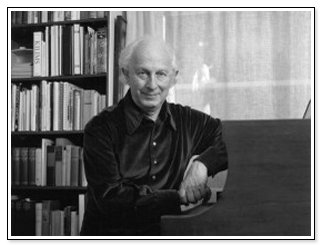 BD: Are they mostly biblical?
BD: Are they mostly biblical?
JA: No, not mostly
biblical. There’s Blake, and John Donne, and Ezra Pound, and May Swenson,
and other contemporary poets. There’s lots of good guys out there.
I found, both as a conductor and as a composer presenting his own work, that
the public likes to be in the know a little bit. I like to give them
a way of entering into sympathy with the piece they’re about to hear.
At all concerts that I do, I talk a little bit about it. I did a concert
last Saturday in Portland with my youth orchestra and three university choruses.
We did the fantastic choruses from the Berlioz Lelio. Who’s ever heard Lelio? Not one person in five thousand!
So, with each piece I give them some insights into the work, and talk about
different aspects. I never just go through a program talking about the
composer and his family life, or his education or his posts, but I don’t talk
about the same thing every time. In one case, if I talk about the sociology
of the work, on another one I may talk about the biography of the composer,
and on a third I may talk about the instrumentation. In a given evening,
they’re not going to sit there to expect to be force-fed, much less spoon-fed,
the same kind of thing about each piece, but I try, as I say, to give people
a way of entering into sympathy with what they’re going to hear, especially
if they are apt not to know anything about it.
BD: More than
just what they would read in the program notes?
JA: That’s right.
For many years now, I’ve eschewed printed program notes. I do these
as verbal program notes. It began in an interesting way because we moved
out of our Civic Auditorium for a two-year period while they were renovating
it. They did a wonderful job, but we moved into a smaller theater called
The Oriental Theater, which is like the old City Center in New York, full
of gargoyles and things in it, and with a wonderful acoustic but terrible
lighting in the house. So the audience couldn’t read the program notes,
and at that time I thought, “The devil take the lighting
and the printed program notes. I’ll tell them!”
Well, I got such great feedback from it. People would stop me on the
street and say, “What a wonderful idea! It bridges
the distance between the stage and the audience.”
Or they’d say, “It makes us feel that the orchestra
belongs to us.” So when we moved back into the
renovated auditorium, though the lights were fine, I just continued with my
practice in doing away with program notes. Once in a great while, when
for separate reasons it is not appropriate to do any talking, I’ll put program
notes in, but that’s my offering about what to expect of the audience.
BD:
When you write a piece, what can the public expect from your piece, and
from you?
JA: I’ve always
tried to write music which has coherence. I believe in melody, I believe
in rhythm respected positively and negatively but with the sense of body rhythm
being a kind of norm. I write music in which if a wrong note appears,
one can tell. I can tell it’s a wrong note. I’m no respecter of
music where it can be misplayed and the composer doesn’t know that there are
things going on that he didn’t write, so to earn my own respect I like to
be able to hear everything. I’ve never written a note that I don’t
believe in, and I would hope that coherence that I strive for in my pieces
has some impression on the hearers. I hope that hearers of it have a
sense that my music has balance, and that the flow of the piece has a sense
of destination, of arrival, of tension of relaxation, and of conclusion.
I like not to write pieces which could have stopped three minutes earlier,
or could have gone on another five minutes. How you just judge that
is hard to say. I don’t think I could define that for you, but coherence
is the word I’ll stand by.
* *
* * *
BD: You were
appointed by President Johnson to be on the National Council of the Humanities.
What did this entail?
JA: That was
one of the more interesting assignments I’ve ever had as a civic contribution.
First of all, it’s a distinct honor to be named by the President of the United
States to a national council. Those were the early days of the Council,
and what it entailed was to review projects which were submitted by humanities
groups around the country for the promotion and dissemination of all the subjects
that would come under the umbrella-term ‘humanities’.
BD: So it wasn’t
just music?
JA: Oh no.
That assignment had nothing to do with music! In fact, I was the only
musician on the Council. We had distinguished novelists, mathematicians,
historians, and all kinds of people who were classical scholars and so on.
The nicest answer I ever heard about why I happened to be on it was when some
Congressman at a cocktail party asked Barnaby Keeney about me. Keeney
was then Chairman of the Council, and when he introduced me and said I was
a composer and conductor, the Congressman said, “What’s
a musician doing on your Council?” Without batting
an eyelid, Keeney said, “Well, for one thing, he’s literate!”
I really appreciated that comment. I’ve always liked to be thought
of as a literate person. So what we did to review projects submitted
from around the country. I was Chairman of the Standing Committee on
Public Programs, and was responsible for a program that went for several
years in finding people who were good at talking to the general public
— what I called at that time ‘The Pied Pipers’ of our academic
world. In every university and college, I said there are a handful
of people who are not only highly regarded in their field by their peers,
but who somehow or other have the knack of going out and talking to the butcher,
the baker, the candlestick maker. I would call them the Pied Pipers,
and I helped to find them and encourage them to go out and spread the substance
of these humanity subjects among the citizenry. That became known as
the ‘Avshalomov plan’ for a while.
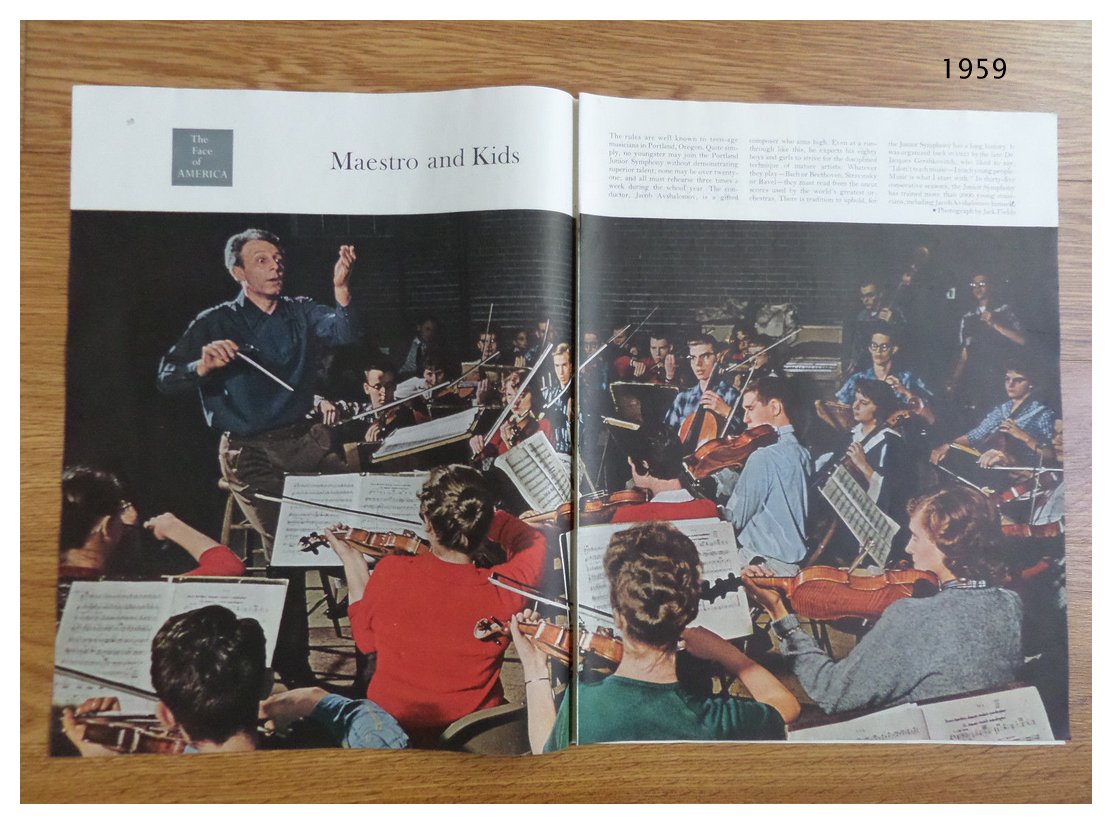
BD: Is it a mistake
that college professors deal only with other college professor-types?
JA: It’s largely
a matter of temperament. I can’t say that it’s a mistake. I think
it is a mistake just to talk to people within the profession because it tends
to be, and is in such danger of becoming, jargonised.
BD: Is there
that same danger in the way you write music?
JA: Absolutely.
I say this at the risk of my neck among academic composers, but there has
arisen a whole category of music which could be described as ‘academic
music’, which would never get written and would never
get heard except that it’s protected by the walls of the campus and the performing
arts centers. That music would never make it on its own among the wider
public. Of course there is room for that kind of music, but it’s dangerous
to remain in that kind of seclusion or hibernation without venturing out into
the chill winds of the greater public. Every creator needs that.
It’s very bracing, very salutary.
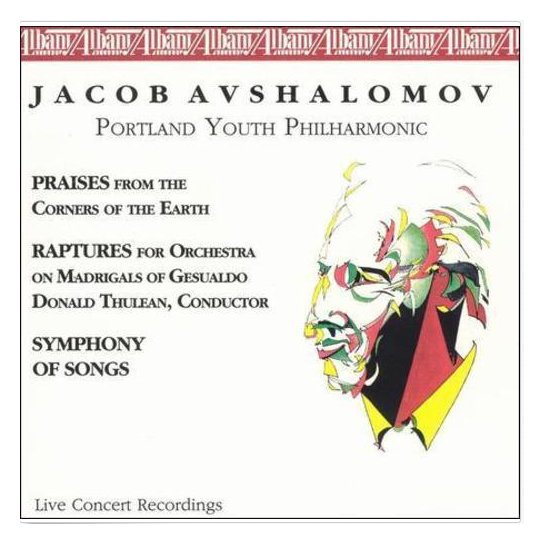 BD:
You conduct a lot of your own works.
BD:
You conduct a lot of your own works.
JA: Some, yes.
BD: Are you the
ideal interpreter of your works?
JA: I wouldn’t
say so, no. I heard a recording this morning done by the mentor of Lee
Kessleman, who runs the choral program here the College of DuPage. When
he and his wife were at Macalister College, they did a performance of my
piece, Tom O’Bedlam, and he and his
wife sang in it, and it was done by a wonderful conductor. The group
was excellent, and the training was superb. There were some things about
it which were different from what I had in mind, but there were also some
insights into the piece that I hadn’t foreseen at all. I don’t know
that if I were to conduct it I would do it his way, but I respected very
much his deviations from my normal expectation. So I wouldn’t say a
composer is the ideal conductor, necessarily, and especially composers who
aren’t experienced in conducting. You remember Tchaikovsky’s saying
that his head was literally going to come off while he was conducting because
he was so nervous about it.
BD: Do you enjoy
composing?
JA: I enjoy composing,
yes. Do you mean is it a pain and a drudge?
BD: Is it something
to look forward to?
JA: [Suspiciously]
Sometimes... [Both laugh]
BD: Funny, I
always get that answer. [More laughter]
JA: There are
always bad days. There are bad weeks. There are bad months, also,
but when you get moving, it’s very enjoyable. There are two things
that enable me to swim freely when I’m working. If it’s an orchestral
or instrumental piece, when the main sketch, the short score, is done, and
the course of the piece is thrashed out and wrestled with from beginning
to end, the scoring and the orchestration is a great delight to me.
I learned how to orchestrate from my father, who was a master of that.
I’ve always enjoyed that, and I have to say I like the way my scores sound.
Not many years after I began scoring, I found there weren’t too many surprises
when it came out in the orchestra. It would be played, and if it were
reasonably well played, my response would be that it was just about what
I had in mind. The other thing that gives me a good swim is dealing
with a text that really moves me. At least half my output has been vocal,
choral, or songs, and that brings us back to your opening question of what
about an opera. Usually the texts that I’ve set have been more thoughtful
or ethical than dramatic, so I don’t feel the lack of action, lighting, and
costumes. I feel that the music can convey the drama, and that my task
is to provide a setting forth of these ideas written by some fine writer.
* *
* * *
BD: Let me go
in a little different direction for a moment. Do you feel that the
big explosion of electronics in the home — the reproducing
equipment — has had a big impact on audiences today,
and if so, is it positive or negative?
JA: I can’t honestly
say that I have any measure of that at all. I’m not an electronics man
in any way. I can change a light bulb, but I’m not much good at anything
else of that sort. I’m not a ‘gadgeteer’. I never have been one,
and I have the feeling that I will probably live out my life and my career
without ever getting involved in electronic music. It’s a severe limitation,
I admit, and it would be damning if it were heard by practitioners of electronic
music and studio people. I have to say that some of my best friends
have been studio people. Vladimir Ussachevsky
and Otto Luening were
colleagues of mine at Columbia for many years. Actually Ussachevsky
and I were colleagues before that, in Washington, D.C. At the end of
World War II, we were both at the Office of Strategic Services. We worked
on the China desk, having both come from the Far East. So I’m serious
and sincere when I say some of my best friends are electronic composers, but
it’s just not a medium that interests me at all. I prefer instruments
which we inherited. I love the human voice, and the presence of the
computer and computerized sound and synthesized sounds bring us to the brink
of an era when any number can play it. Composing becomes a game which
any number can play, and for the first time in the history of man you can
produce what would might pass for a composition without knowing anything about
music. I don’t know if that’s good or bad, but my attitude will tell
you that I’m a bad person to assess the influence of that on the society.
BD: It is good,
though, that many of your pieces have been recorded and are on records for
people to hear?
JA: Oh, from
that point of view it’s wonderful, and not just for me. It is wonderful
that we have at our beck and call all the music that can be resurrected from
the beginnings of written music. We can have Perotin (fl. c. 1200) and
Josquin des Prez (c. 1440/55-1521), and all the wonderful people up to and
through Boulez and the
youngest Turk you care to mention! It’s wonderful, and one of the nice
things about it is not only that it’s all available, but it implies a kind
of coexistence of music. Good doesn’t have to replace bad, new doesn’t
have to replace old, and in America, of all places, that’s a lesson we need
to learn. We also need to learn that in architecture. When a
house gets to be sixty years old we think it’s for the junk heap. When
we get to Europe, we find there are buildings three hundred years old, nine
hundred years old, even fifteen hundred years old. Then when
we get to China or Egypt, we find things that are four and five thousand years
old. Then we have a sense a time. In America we need to learn
to live with the old and the new, and in that sense the ability to reproduce
sounds in all our wonderful ways is just a richness that no other generation
has ever had. So, of course I am one of those that benefit from it.
I have to say it was a delight for me to come here to Glen Ellyn and the
College of DuPage, and find the campus radio station equipped with almost
all the recordings of my works, and to hear performances that I didn’t even
know about!
BD: Do you feel
that you are part of a line, a lineage of composers?
JA: Oh, absolutely.
I feel that very much, and I have a pretty good feel for where I fit in.
If we were to take a shelf of scores and line them up here — a
hundred pieces of various kinds — I have a pretty good
idea where my scores would fit... with a certain humility of course.
I could draw boundaries by naming composers around me to give you three or
four points for an area, and say that my music resides somewhere in that area
bounded by these people. I don’t feel that that diminishes me in any
way. Everybody has to start somewhere, and to answer an unasked part
of your question, if I may say so, is that I do feel the need to communicate
to citizens of society. I don’t write it to put it in the drawer.
I don’t feel that I have ever written music to pander to a popular taste
— although I have written music to assignment, which is another
matter, following my own tastes and responding to a request for a certain
kind of piece. But I do feel that it’s meant to communicate to people
— not necessarily to professional musicians, but to the average
person who really has a love of listening to music.
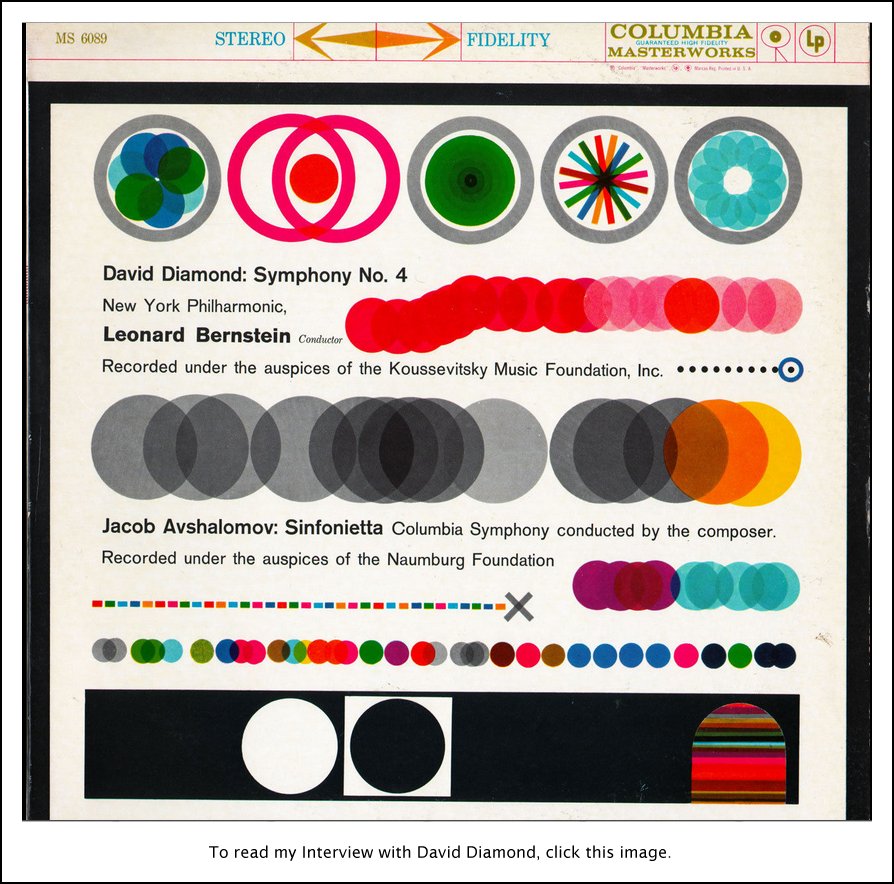
BD: Is there
any competition among living composers?
JA: I suppose
there is but I’m really not all that aware of it. Are you speaking
aesthetically, or financially, or socially, or of anybody nudging anybody
out of a good commission, or a good job, or a good performance or something
of that kind?
BD: Something
like that.
JA: I wouldn’t
think so. I have to say I’ve never felt it. I’ve never felt pushed
aside by anybody else. On a rare occasion, on a program where there
are two or three contemporary works, I have been annoyed by someone insisting
on more rehearsal time for his or her piece than it seemed to deserve, when
I got the shorter end. But that’s a kind of detail that has to do with
the mechanics of a particular festival, or a particular concert.
BD: Do your pieces
stand better in a concert with several standard works, or in an all-Avshalomov
concert, or in an all-contemporary concert?
JA: Despite my
distinct pleasure at this festival of my music here, I generally don’t favor
a series of works by one composer. It’s a wonderful thing to do from
time to time. I remember a marvelous concert given by the Dessoff Choirs
in New York under Paul Beopple thirty-five years ago... an entire evening
of the music of Josquin des Prez at a time when little of his music was available
in modern scores, and you didn’t hear much of it. The few things we
did know were very few and far between. To walk into Town Hall and hear
a whole evening of twelve or fourteen works by Josquin des Prez was a wonderful
eye-opener for me in the sense that you got past the accidents of any particular
work, or the quirks of any two or three works, and begin to see this flow
of a person’s mind and spirit. I am getting that kind of a showing
here, and I appreciate it personally very much, but I wouldn’t expect it
was my due to have that happen very often. I generally feel better
if a work of mine is included in a substantial program by a well-prepared
performing unit, and I’d be quite content to go along with reasonable performances
in that proportion. As a conductor, I tend to build my own programs
in the same way. As for programs consisting entirely of contemporary
music, I think that’s a lot to swallow in one evening. There are groups
that dedicate themselves to that, and in the days when we were living in New
York, I remember joking about the fact that the ISCM [International Society
of Contemporary Music], the leader of composers in concerts of that kind,
the same two hundred and fifty people attended those concerts whether you
gave them in London, Paris, Berlin, or New York. Only their names were
different, but the same little clique of hardened people would come.
But for the average person who loves music, that seems like a little much.
It’s like having a meal consisting entirely of aperitifs, or desserts, or
entrées and so on, and it’s just not very humane.
BD: So it’d be
better to have one piece on a regular Philharmonic concert?
JA: Exactly.
If we could get every performing unit in the world to include a reasonable
portion, say eighteen per cent of playing time on every program of music written
within the last twenty to forty or sixty years, it would be a happier life
for all parts, including the box-office.
BD: How can we
get more contemporary pieces on concerts by the big orchestras and the big
opera companies?
JA: Do you want
the optimistic answer or the pessimistic answer? [Bursts out laughing]
No, I’ll give you the one answer I have. It’s never going to happen.
Isn’t that terrible conclusion? I’ve pondered that for forty years,
and it’s never going to happen. The audience for contemporary music
is not growing. We’re talking about a minuscule proportion of the population.
Are you aware of the fact that serious music — operatic
and symphonic music, and including chamber music — touches
about four per cent of the population? I did a talk at the Spoleto
USA Festival about three years ago to the subject — Where
is Our American Music — and I did a fair amount of
research, including a little personal survey that I made. I’m delighted
to be able to say to you that I wrote to about eighteen orchestras of various
levels, size, and greatness, and I got unanimous response from their managers
and/or conductors, and/or players to give me a listing of their contemporary
works done in the last so many years. So I got a very good picture of
what’s going on, and the fact is it’s very dismal. Contemporary works
are the rarity on subscription concerts. Lots of conductors don’t care
for them, and players tend not to like contemporary music. It’s a simple
fact. Audiences bristle and are bored... I have to say with some reason,
because a lot of pieces are just plain dull — including
some of mine, I guess — and I don’t know if that can
ever be turned around. Then from the point of view of box-office managers,
they scream that every time they do more than a certain amount, attendance
falls. The university circuit, of course, has been the Godsend in this
country.
BD: There, of
course, the whole of business of money is thrown out the window because you
don’t have the same need to get huge audiences. You have your built-in
audiences, and you have almost free rehearsal time.
JA: That’s right.
But that has the opposite side — which we talked about
earlier — with this kind of protected space, a composers’
sanctuary.
BD: The Ivory
Tower!
JA: That’s right,
the University Circuit. The piece that is written for that audience
has even less of a chance of getting outside, off the campus into Orchestra
Hall downtown. So it’s not an easy road. In fact, if we had three
hours we could talk about the future of composing.
BD: Well, briefly,
where is music going today?
JA: [Laughs]
We’re on the brink, as I say, of composing becoming a game which any number
can play.
BD: Are there
too many composers today?
JA: There are
too many composers for the number of users. You were talking about
it being a boon to have my work and other people’s works recorded and available
on cassette, and disc, and radio and TV... Of course it is, but with
that kind of instant communication, how many composers are really needed
to keep the orchestras of the world supplied? Not very many!
When the Shostakovich Seventh Symphony
was written — the great piece which helped win us World
War II — the premiere was sought and fought over by
various orchestras. They decided it could be done in this country by
two orchestras simultaneously. By radio it could be done all over the
world within a very short time. Now, with instant communication by
satellite, and with the print-outs that we have, one new work could be supplied
to every orchestra on Earth in the same week. They could all do it,
so how many composers do you need? In a way, our whole concept of art
will turn more to the paper plate syndrome and Kleenex syndrome.
BD: Like junk
food?
JA: Disposable
art, yes. We may lose the illusions and notions about immortality, longevity,
and the statement for a long time ahead.
BD: Do you not
write your music to last for a hundred or two hundred years?
JA: Of course,
forever! This is in the sense that as long as there are people with
ears and voices and hands to play the instruments for which they are written,
and who take pleasure in doing it. In my view, music is essentially
something to do rather than to buy or sell. Through the door we’re hearing
that orchestra rehearsing, and around the corner are those people who are
raising their voices in King David
by Honegger. These are things to do. It’s essentially gratifying,
not to say inspiring and ennobling, to get a group of people together
— between forty and a hundred and forty in a chorus
— to sing a fine piece of choral music. The sense of elation
that sweeps over every individual there into every fiber of every human being
there cannot be produced by any other means. It cannot be produced by
a machine, and the machine, no matter what it is, can never share those feelings.
So that’s what I mean when I say then that music is essentially something
to do. It’s for the doer, and only as a byproduct is it for the audience.
In my own pieces, as long as there are people who care to do that, I hope
it would last and give them pleasure. That’s another thing that is
being demonstrated by this enormous range of availability — that
the sense of new-fangled or old-fashioned is a very temporary thing.
A piece or an artwork can be old-fashioned for just a short time. It
can be displaced by something avant-garde now, and last year’s, last decade’s
could be viewed and felt as old-fashioned for a decade or two. But
a little beyond that, it becomes a period piece. The sense of derogation
comes with being old hat has gone. It’s only old hat when you hear something
to death, and you wished to God there were a fresh minty taste in your mouth
for the music. But after a while it takes its place in the historic
spectrum. Who would say, nowadays, that the elder Bach is old-fashioned,
which his sons and the composers of their period thought? It’s absurd.
So this general availability is helping us prove the possibility of this
coexistence, and that’s a great thing.
* *
* * *
BD: You’ve had
commissions — even from a plywood company!
JA: Yes, but
I have to say right off that it’s not one of the pieces I’m proudest of.
BD: Turning it
back on what we were just talking about, should companies, and corporations,
and groups, and even individuals, go to composers and commission them for
Bar Mitzvahs and for weddings, and for occasions and anniversaries of their
companies?
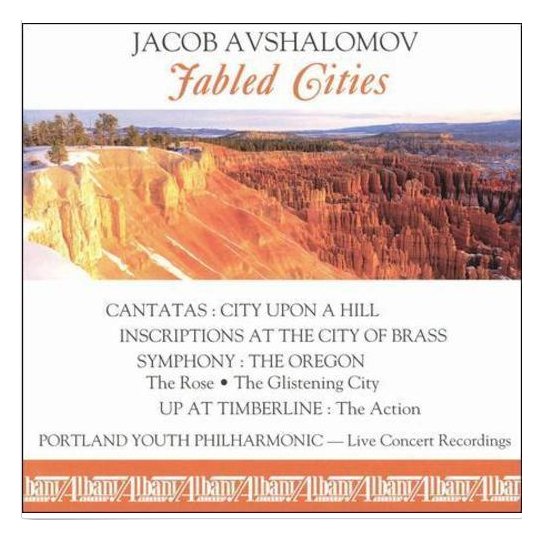 JA:
If they have the firm belief that something can be produced that will enhance
their occasion, while encouraging its creator to be truly himself and producing
what he or she considers to be truly a work of art, that’s fine. If
it’s just hack stuff to provide background music at a cocktail party, I’m
not so much in favor of that. But you’re talking about something comparable
to the corporate paintings and sculptures that are coming out, I don’t see
any harm in that as long as there is integrity on the part of both the commissioner
and the ‘commissionee’. There’s no good yardstick for integrity, but
there’s a good yardstick for the lack of it.
JA:
If they have the firm belief that something can be produced that will enhance
their occasion, while encouraging its creator to be truly himself and producing
what he or she considers to be truly a work of art, that’s fine. If
it’s just hack stuff to provide background music at a cocktail party, I’m
not so much in favor of that. But you’re talking about something comparable
to the corporate paintings and sculptures that are coming out, I don’t see
any harm in that as long as there is integrity on the part of both the commissioner
and the ‘commissionee’. There’s no good yardstick for integrity, but
there’s a good yardstick for the lack of it.
BD: So if someone
came to you and asked you to write a piece and it wasn’t something you wanted
to write, you’d turn it down?
JA: Oh, sure,
and I have. I had a very interesting experience a number of years ago
when I was in New York. They were going to do a Broadway production
of the story of Turandot, and they
wanted some background music for the play. So I came down with some
samples of some music that I had.
BD: Did they
come to you because they knew of your connection with the Orient?
JA: No, I don’t
think so, but that’s possible. It didn’t occur to me at the time, or
if they did I’ve forgotten it. But any case, that’s a good point you
made. I came with a swatch book, so to speak, which had some recordings
of some things that I’ve done. I also played them three or four samplings,
portions of pieces and so on. There was a famous actor on Broadway in
those days called Canada Lee [1907-1952], and when I was all done, he scratched
his head and said, “Have you got anything with a tune
in it?” That set the mood for the further negotiations.
I said, “Why don’t we do a practical thing? You
give me a song that you would like me to set, and I’ll bring you one in a
couple of days.” They gave me a text of a song,
and I took it home. Two or three days later I came back and played
it and sang it for them. They went to confer, and Maurice Valency,
a famous translator of French plays and a playwright in his own right, who
was then one of my colleagues at Columbia reported back to me. He said,
“They didn’t quite feel the style was familiar enough.
They didn’t want it to be something they’d heard a thousand times, but maybe
something they’d heard twenty-five times!” So
I said, “Maurice, I don’t think it’s going to be any
pleasure for me to do that, and you’d better find somebody for whom that’s
more congenial.” So I just stepped aside.
On the other hand, the piece I just finished in Oregon is called Up at Timberline. I was asked
to write a piece for the rededication of a famous lodge on Mount Hood, which
is a very scenic and beautiful mountain in Portland. It was the result
of WPA [Works Projects Administration] efforts in the ’30s,
which President Franklin Roosevelt came out to dedicate. The artwork,
carvings, upholstery, draperies, windows, mirrors and everything were done
up by WPA Artists. It was thought to be quite a remarkable structure,
but over the years, all that stuff had become sort of shop worn and soiled
and worn out. So a group called ‘Friends of Timberline’ commissioned
the renovation, and somebody digging into the archives remembered or discovered
that at the time of the original dedication they had music at the lodge, which
is fifty miles out of Portland. So they came to me and asked if I would
write a piece for the rededication of the lodge.
BD: Why didn’t
they go back and use the same piece they had at the original dedication?
JA: Well, they
might have! But maybe they didn’t have any record of what it was that
they used. I don’t know, but in any case they came to me and asked if
I would write a piece. I thought it was a nifty idea, and I wrote a
three-movement piece. This lodge has an interesting structural feature
in that downstairs there’s an enormous four-sided fireplace. You might
have called them walk-in fireplaces. They’re that large, with lots of
masonry. They’re very ponderous, and the chimney goes up two stories.
Then there’s a very tall skylight, and up at the second level there’s a balcony.
So I thought I would write a piece that was antiphonal vertically rather than
horizontally, in the sense of going up and down the mountain.
BD: To get the
audience in your desired frame of mind?
JA: Yes.
I don’t want to give you the whole creative process, but I came up with a
piece in three movements, the first of which was called The Mountain. I began with pre-historic
primordial sounds of winds and rain and storms, and whatever mountains suffer
in the course of the eons. Then a second movement, which I call The Lodge, which refers to Timberline
Lodge, but there are also implications of the lodge of the Native American
Indian. So there were some evocations of that kind of culture.
The third movement is called The Action,
meaning not only the ski lodge in the social action but all kinds of action.
In it I gathered together three of the best known pop tunes of the 1930s,
and so I have a three-movement section for a curious group of woodwinds including
saxophone, and brass plus string bass, and I added a little percussion.
They play up to down, and down to up, and often together. It’s going
to be played at the dedication, so there’s an answer to your question about
writing a piece upon request. I took their assignment seriously, and
I’ve turned out a piece which has serious application, but at many points
a very light-hearted result.
BD: You head
each one of the movements with a title. How do you decide on some of
the titles of your other works? You were talking earlier in our conversation
about titles maybe being reflected at the box office with more sales?
JA: No, I think
it was more in connection of what I expect of an audience, and what I offer
to an audience. They can be intrigued by various things, and among them,
the titles. I don’t think, for example, that The Afternoon of a Faun would have anything
like the currency it does if it were called, you know, A Factory at Rouen...
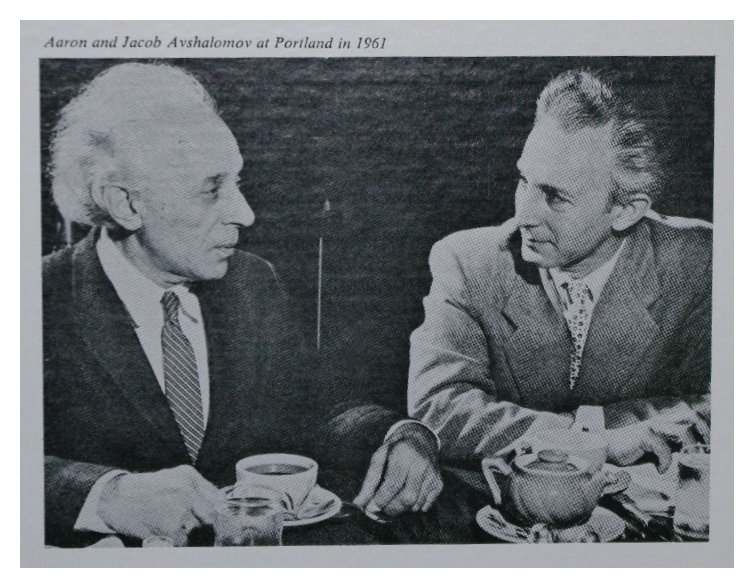 BD: … or Mood
Piece in F Sharp!
BD: … or Mood
Piece in F Sharp!
JA: [Smiles]
Or Mood Piece in F Sharp! Quite!
A generic title is not very evocative.
BD: Thinking
about this piece today, it’s just called Sinfonietta. Why didn’t you call
it An American in Shanghai?
JA: [Laughs]
That’s a good point. I started thinking about that work in terms of
a symphony without development. It was a kind of proving ground for
myself. Could I write a symphonic piece? My natural inclination
is write more colorful, or more dramatic, or more expository kind of music.
So in proving to myself that I dared try it, and hoping that I might succeed,
I gave it the title of my aspiration.
* *
* * *
BD: Let us talk
a bit about your father. Tell me about his musicianship and his musical
compositions.
JA: My father
was born in Siberia, and he was largely self-taught, although he had a little
instruction in Switzerland in his early days. But he was spirited out
of Siberia at the time of World War I, being the only son in the family to
go to a safe haven in America. But he grew up in Siberia. There
was a large Chinese colony, what we would call a Chinatown. One of the
men who worked for his father — my grandfather
— was Chinese, and as a little boy, my father often used to run
to the Chinese quarters and listen to Chinese opera. So he was imbued
with that. On his travels through China on his way to the United States,
he became so hooked on Chinese culture — Chinese music
and Chinese art and drama. After meeting and marrying my mother in San
Francisco in 1917, decided he wanted to go back to China, and spent a thirty-year
period there where he created, almost single-handedly, an entire repertory
of works which were an attempt at a synthesis between Chinese materials
— musical, scalar, coloristic, topical — and
western media. He’s written four or five operas, five or six ballets,
three symphonies, three concertos, and lots of small pieces all using pentatonic
mode,. He is viewed as sort of the Great White Father of Chinese composition.
Just last summer I went back at the invitation of the Chinese government to
help them celebrate the ninetieth anniversary of his birth in a series of
concerts in Peking and Shanghai and Wuhan, some of which I conducted.
He emigrated to this country in ’47, and died in 1964. He was never
able to transplant his career from China to here, and had lived a very modest
life towards the end without success... although he did get recognition by
some people who counted. Koussevitzky commissioned his Second Symphony, and Stokowski and Monteux
conducted his works, but he never made a career in this country. But,
speaking of integrity, he had enormous integrity. He kept composing
to the end and his last opera – The Twilight
Hour of Young Yan Kuei Fei – about the famous courtesan of the eighth
century or so, will probably be given its premiere in China this next year.
He was a wonderful man, a wonderful musician.
BD: Did he approve
of your compositional style?
JA: I rather
think he did! He was a great help to me. He was one of my important
teachers, and we did what could be only described as a correspondence course
in composition for a couple of years when my parents were estranged.
He lived in Shanghai, and I stayed with my mother in the U.S.
BD: One of the
CRI records pairs your father’s work and your work.
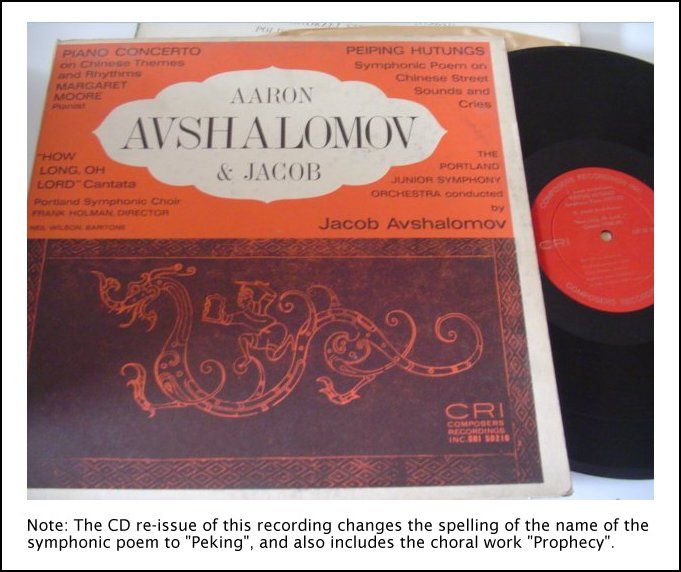 JA: Yes. The record done by my student orchestra
in Portland, and there are two works of his — the Piano Concerto in G on Chinese Themes and Rhythms,
which is a great work in my view, a full-fledged, full-bodied late nineteenth
century work but with Chinese overtones. It’s not very well known.
And a piece called Peiping Hutungs,
which is sort of a stroll down the alleyways of Peking. The Chinese
word ‘Hutung’ is rather like the German word ‘Gaβe’, with the smaller streets.
They’re very maze-like there, and this is a description of a day in the
city from daybreak to dusk. As the city comes alive, there are the
sounds of street cries and hawkers and vendors and so on, and you pass a
funeral procession, and there’s temple music. There’s only one piece
of mine, and that’s the Cantata How long,
Oh, Lord, which is dedicated to my father. We did that recording
as a tribute to my father. That’s Old Testament text from Isaiah, Habakkuk,
and Psalms. It calls for baritone solo, mixed chorus, and orchestra,
and is a fairly early choral piece which runs about sixteen minutes.
JA: Yes. The record done by my student orchestra
in Portland, and there are two works of his — the Piano Concerto in G on Chinese Themes and Rhythms,
which is a great work in my view, a full-fledged, full-bodied late nineteenth
century work but with Chinese overtones. It’s not very well known.
And a piece called Peiping Hutungs,
which is sort of a stroll down the alleyways of Peking. The Chinese
word ‘Hutung’ is rather like the German word ‘Gaβe’, with the smaller streets.
They’re very maze-like there, and this is a description of a day in the
city from daybreak to dusk. As the city comes alive, there are the
sounds of street cries and hawkers and vendors and so on, and you pass a
funeral procession, and there’s temple music. There’s only one piece
of mine, and that’s the Cantata How long,
Oh, Lord, which is dedicated to my father. We did that recording
as a tribute to my father. That’s Old Testament text from Isaiah, Habakkuk,
and Psalms. It calls for baritone solo, mixed chorus, and orchestra,
and is a fairly early choral piece which runs about sixteen minutes.
BD: Then you
also have other works on other records...
JA: Right, there’s
a CRI record of contemporary American choral music [shown at the top of this webpage].
John Dexter and the Mid-America Chorale conducting a piece called Prophecy, which is on a text of Isaiah.
That was an interesting project, initiated by Cantor David Potterman of the
Park Avenue Synagogue in New York. He has a number of composers
— some of them not Jewish at all — write
music that might help enrich the liturgical music which he felt had gotten
sort of stagnant, with a lot of dependence on rather gooey nineteenth century
pieces. A lot of my friends — many on the list
of composers that you have interviewed — had written
for him, and he had a selection of texts. So I chose one of them, and
wrote that piece. It runs about six minutes, and although it’s an old
piece, it’s a piece I still like. I tend to like all my pieces, I
have to say!
BD: There are
none of your pieces that you would like call back?
JA: Well, the
plywood piece that you were talking about. [Both laugh] That
was really sort of a pot-boiler. Another one on a CRI that I really
think is good is a piece called Phases
of the Great Land, which is an interesting sort of piece. It
was commissioned for the Anchorage Festival by Robert Shaw, who did the
premiere of my choral piece, Tom O’Bedlam.
That was done in the days when he was up there conducting the Anchorage Festival,
and he felt that the chorus got a disproportionate amount of the attention
and acclaim. The orchestra was sort of feeling orphaned, and in order
to restore their morale, he thought a commissioned piece for them would be
a good idea, and asked me to do it. It’s a two-movement piece, and
I got into the mood of writing it through the son of the composer, Ernest
Bloch. Bloch’s grown son was a very well-known industrial engineer
and consultant, working out of the Northwest. He spent a lot of time
in Alaska, and we knew him as a personal friend. He just filled me
up on Alaskan lore, and life around the turn of the century. So I wrote
this piece as Phases of the Great Land
meaning like phases of the moon. The two movements were ‘The Long Night’
and ‘The Summer Days’, the two apposite things. In ‘The Long Night’
there’s a bar-room scene which uses three of the best known waltzes from
that time, and a temperance song, and a bar-room brawl, and so on.
When I heard that Anchorage had the largest per capita number of planes of
any airport in the United States, that really made an impression on me, so
the second movement starts off with airplane sounds! It’s a fairly
interesting piece.
BD:
Alaska is very close to my heart because last summer we had a cruise up
the Inside Passage.
JA: Oh, that’s
beautiful. We’ve not been [to that part of Alaska], but we know people
who have.
BD: It’s wonderful.
We stopped at Skagway and Ketchikan and Juneau, and it was just a fabulous
week. We also saw Glacier Bay. Just the way the whole tour was
laid out was just wonderful.
JA: Oh, that’s
nice!
BD: It was a
fabulous adventure, and I encourage anyone and everyone to experience it.
Did you not go to the premiere of your work in Alaska?
JA: Oh, we did,
yes. We went up and it was thirteen days of the hardest conducting work
I’ve done in a long time. [Laughs] We had a community orchestra
there which largely relied on military personnel who could or might not be
released to come to the rehearsal because they were on KP or guard duty.
[More laughter] So it was a little bit harrowing, but later we recorded
it with my orchestra in Portland for CRI. Also on CRI is The Taking of T’ung Kuan. That was done with the
Oslo Philharmonic, conducted by Igor Buketoff. That’s a piece Stokowski
played here but he didn’t record it. [It was later issued on a CD, as shown below.]
It’s a sort of ‘battle piece’, having to do with the defense and the fall
of a famous mountain pass, the T’ung Kuan Pass, described in the poem by Li
Po, an actual occurrence in the middle of the eighth century.
BD: Back to Eighth
Century China again!
JA: Right.
That was my first big orchestral piece, and it sort of screams. It’s
quite ‘Chinese-y’.
BD: Thank you
for being a composer! It’s been a pleasure talking to you.
JA: A pleasure
to talk with you. It was nice of you to come out and do this.
I appreciate it.
© 1986 Bruce Duffie
This conversation was recorded in Glen Ellyn, Illinois, on March 3,
1986. Portions were broadcast on WNIB the following year, and again
in 1989, 1994 and 1999; and on WNUR in 2006. Comments from the interview
were included as part of a program in 1994 celebrating the 100th birthday-anniversary
of his father, Aaron. This transcription was made in 2017, and posted
on this website at that time. My thanks to British
soprano Una Barry
for her help in preparing this website presentation.
To see a full list (with links) of interviews which have been transcribed
and posted
on this website, click here. To
read my thoughts on editing these interviews for print, as well
as a few other interesting observations, click here.
* * * *
*
Award -
winning broadcaster
Bruce Duffie was with WNIB, Classical
97 in Chicago from 1975
until its final moment as a classical station
in February of 2001. His interviews have
also appeared in various magazines and journals
since 1980, and he now continues his broadcast series on
WNUR-FM, as
well as on Contemporary
Classical Internet Radio.
You are invited
to visit his website
for more information about his work,
including selected transcripts of other interviews,
plus a full
list of his guests. He would also like to call
your attention to the photos and information about
his grandfather,
who was a pioneer in the automotive field more than a century ago.
You may also send him E-Mail with comments,
questions and suggestions.
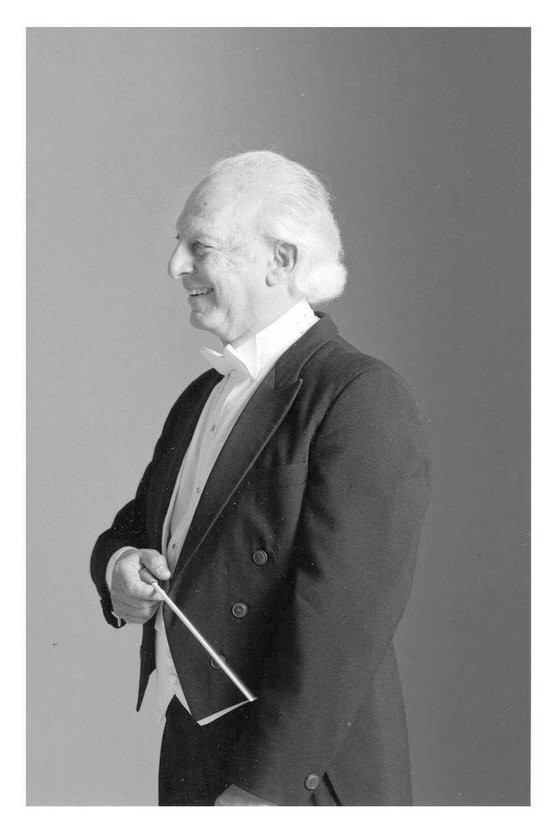

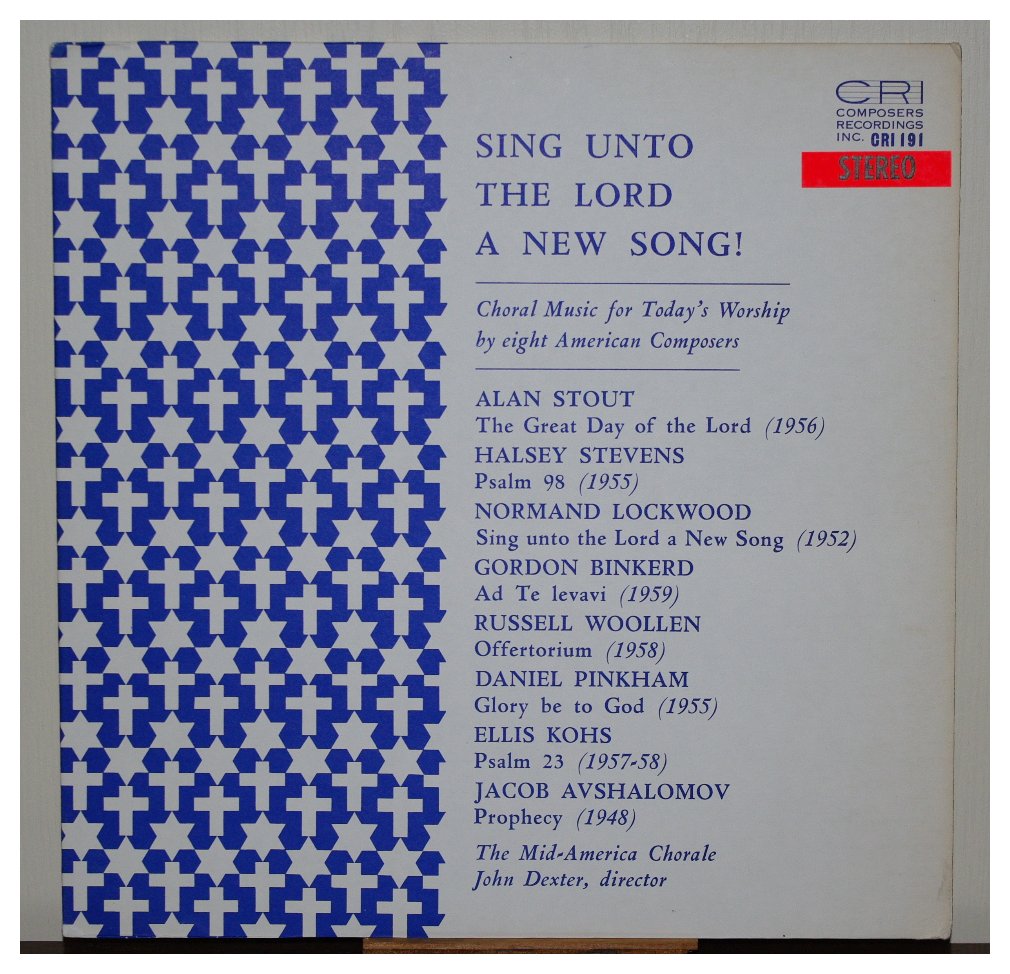


 JA: I conduct The Portland Youth Philharmonic [formerly the Portland Junior Symphony],
which is the first-founded youth orchestra in this country. It’s sixty-two
years old and I’ve been with it for thirty-one years.
JA: I conduct The Portland Youth Philharmonic [formerly the Portland Junior Symphony],
which is the first-founded youth orchestra in this country. It’s sixty-two
years old and I’ve been with it for thirty-one years. BD: Are they mostly biblical?
BD: Are they mostly biblical?
 BD:
You conduct a lot of your own works.
BD:
You conduct a lot of your own works.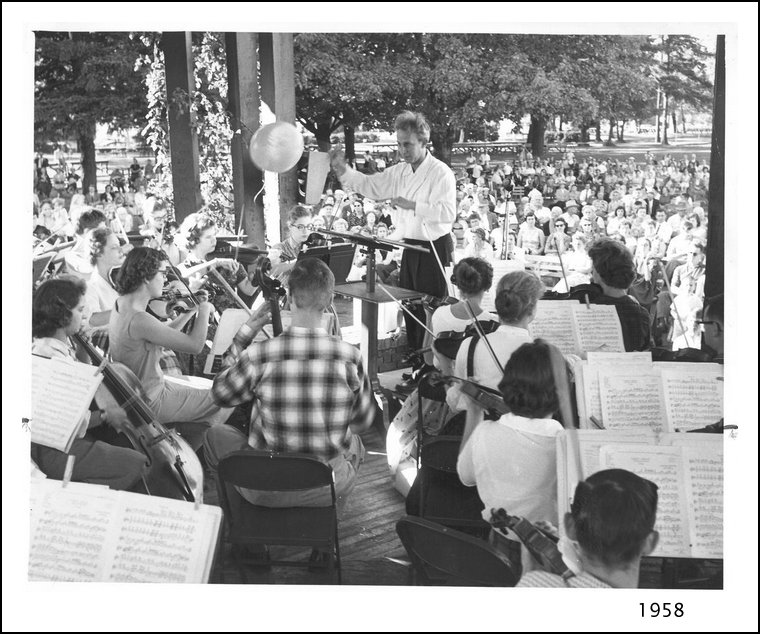
 JA:
If they have the firm belief that something can be produced that will enhance
their occasion, while encouraging its creator to be truly himself and producing
what he or she considers to be truly a work of art, that’s fine. If
it’s just hack stuff to provide background music at a cocktail party, I’m
not so much in favor of that. But you’re talking about something comparable
to the corporate paintings and sculptures that are coming out, I don’t see
any harm in that as long as there is integrity on the part of both the commissioner
and the ‘commissionee’. There’s no good yardstick for integrity, but
there’s a good yardstick for the lack of it.
JA:
If they have the firm belief that something can be produced that will enhance
their occasion, while encouraging its creator to be truly himself and producing
what he or she considers to be truly a work of art, that’s fine. If
it’s just hack stuff to provide background music at a cocktail party, I’m
not so much in favor of that. But you’re talking about something comparable
to the corporate paintings and sculptures that are coming out, I don’t see
any harm in that as long as there is integrity on the part of both the commissioner
and the ‘commissionee’. There’s no good yardstick for integrity, but
there’s a good yardstick for the lack of it. BD: … or Mood
Piece in F Sharp!
BD: … or Mood
Piece in F Sharp!  JA: Yes. The record done by my student orchestra
in Portland, and there are two works of his — the Piano Concerto in G on Chinese Themes and Rhythms,
which is a great work in my view, a full-fledged, full-bodied late nineteenth
century work but with Chinese overtones. It’s not very well known.
And a piece called Peiping Hutungs,
which is sort of a stroll down the alleyways of Peking. The Chinese
word ‘Hutung’ is rather like the German word ‘Gaβe’, with the smaller streets.
They’re very maze-like there, and this is a description of a day in the
city from daybreak to dusk. As the city comes alive, there are the
sounds of street cries and hawkers and vendors and so on, and you pass a
funeral procession, and there’s temple music. There’s only one piece
of mine, and that’s the Cantata How long,
Oh, Lord, which is dedicated to my father. We did that recording
as a tribute to my father. That’s Old Testament text from Isaiah, Habakkuk,
and Psalms. It calls for baritone solo, mixed chorus, and orchestra,
and is a fairly early choral piece which runs about sixteen minutes.
JA: Yes. The record done by my student orchestra
in Portland, and there are two works of his — the Piano Concerto in G on Chinese Themes and Rhythms,
which is a great work in my view, a full-fledged, full-bodied late nineteenth
century work but with Chinese overtones. It’s not very well known.
And a piece called Peiping Hutungs,
which is sort of a stroll down the alleyways of Peking. The Chinese
word ‘Hutung’ is rather like the German word ‘Gaβe’, with the smaller streets.
They’re very maze-like there, and this is a description of a day in the
city from daybreak to dusk. As the city comes alive, there are the
sounds of street cries and hawkers and vendors and so on, and you pass a
funeral procession, and there’s temple music. There’s only one piece
of mine, and that’s the Cantata How long,
Oh, Lord, which is dedicated to my father. We did that recording
as a tribute to my father. That’s Old Testament text from Isaiah, Habakkuk,
and Psalms. It calls for baritone solo, mixed chorus, and orchestra,
and is a fairly early choral piece which runs about sixteen minutes.